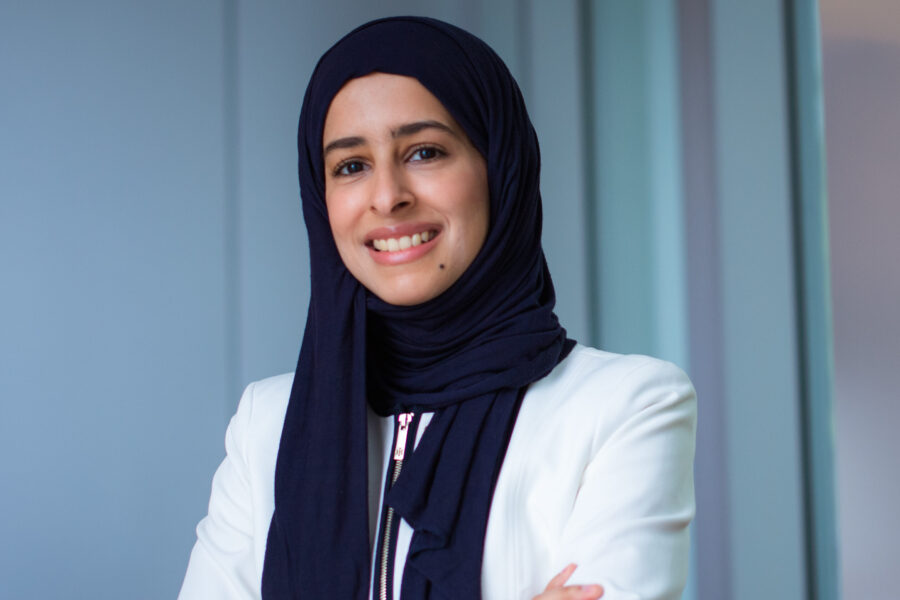Dr. Shahad AlSaiari

Biography:
Dr. Alsaiari received her Ph.D. in Bioscience from King Abdullah University of Science and Technology (KAUST) and did her postdoctoral work at the Koch Institute for Integrative Cancer Research at the Massachusetts Institute of Technology (MIT).
Her doctoral research focused on developing on-demand drug delivery systems using stimuli-responsive nanocarriers with diverse sizes, architectures, and surface properties to deliver drugs in spatial-, temporal-, and dosage-controlled fashions. Her current research focuses on improving food fortification strategies during cooking and storage; and developing microneedle-based COVID-19 nano-vaccine patches that can be self-administered to ensure vaccination where healthcare providers are in shortage.
Dr. Alsaiari’s postdoctoral work at the Langer lab focused on addressing vaccine-related challenges that emerged during the COVID-19 pandemic. She worked on modulating the delivery of subunit protein antigens and assessing the potency of different lipid nanoparticle (LNP) formulations used in mRNA vaccines. Additionally, she worked on assessing LNPs' physicochemical changes associated with different stabilization methods and improving mRNA long-term stability to overcome cold chain limitations, accessibility, distribution, and most importantly vaccine waste.
Alsaiari began her scientific research as a graduate student at KAUST, where she joined Niveen Khashab’s lab in 2014. She has many interesting papers from her PhD in which she uncovered the impact of the controlled release and delivery of therapeutic proteins, such as CRISPR-Cas9 ribonucleoprotein and the FDA-approved PD-1 inhibitor Nivolumab, on anti-tumor immune responses. In addition to her research accomplishments, Shahad has been named to the MIT Technology Review Arabia Under 35 in 2020.
MIT Fellowship Research Abstract:
Dr. Alsaiari's research employs an immunoengineering-centered approach fused with materials chemistry and materials science to create cutting-edge biomaterials with controlled properties to tackle global health issues. Through this interdisciplinary approach, she aims to pioneer advancements that redefine the landscape of healthcare solutions and contribute to shaping a healthier world.
Advancing Vaccine Delivery: Controlling Kinetics and Assessing Immunogenicity
Her research aims to elucidate the intricate mechanisms underlying vaccine responses while striving to enhance their efficacy. Through a comprehensive exploration of immunological pathways and leveraging cutting-edge engineering techniques, she aims to optimize vaccine formulations and delivery systems, contributing to the development of next-generation vaccines that offer improved protection against infectious diseases.
Investigating Immunological Signals in Vaccine Carriers
Recognizing nanoparticles not only as carriers but also as activators of immune pathways is crucial. Understanding their immune characteristics is key to moderating inflammation and optimizing vaccine potency. Dr. Alsaiari’s studies have contributed significantly to understanding how metal organic frameworks stimulate immune pathways without additional adjuvants or antigens and subsequently affects immune responses to subunit protein antigens.
Assessing mRNA Vaccine Immunogenicity and Enhancing Long-term Stability
During the COVID-19 pandemic, disruptions in the supply chain led to shortages of crucial raw materials essential for manufacturing mRNA vaccines. To address this challenge, efforts were made to broaden the sources of lipids used in mRNA vaccine formulations, aiming to reduce dependence on a single supplier and enhance production resilience. Dr. Alsaiari conducted research to explore the impact of various ionizable lipids in lipid nanoparticle formulations on the efficacy of mRNA vaccines. Furthermore, she employed 3D cryofluorescent tomography to illustrate the impact of injecting mRNA vaccines in skin on their distribution within the body, albeit without significant alterations in overall protection compared to muscles.
Typically, mRNA vaccines are stored frozen in aqueous buffer, requiring cold chain access for distribution. However, this poses challenges for equitable vaccine access, especially in developing regions. Dry formulations offer extended shelf stability at higher temperatures by removing water content, addressing challenges related to cold chain logistics and storage. To enhance stability during drying, stabilizers like proteins, synthetic polymers, divalent ions, or sugars are often added. Dr. Alsaiari conducted research to explore the role of hydrogel-like excipients, particularly synthetic polymers, in preserving mRNA vaccine stability during drying. Her research revealed that interactions between vaccine components and polymers influence vaccine properties post-drying while maintaining efficacy.
Micronutrient Powder for in-house iron fortification
Iron deficiency anemia (IDA) affects 1.6 billion people globally, but this can be mitigated through the use of food condiments, providing iron to wide sections of the population without necessitating significant alterations in eating habits. Dr. Alsaiari introduced FulloFe, a new technology that stabilizes iron using natural ingredients. FulloFe contains iron sulfate chelated with natural product-based soft chelators, vitamin C, and histidine. Together, they protect iron across different pH levels, cooking, and storage conditions. FulloFe is a safe alternative to NaFeEDTA, widely used to enhance iron stability in supplements and food products but is not environmentally friendly. It improves iron stability in various foods without altering their taste or texture.
Fellowship Sponsored By:
KACST